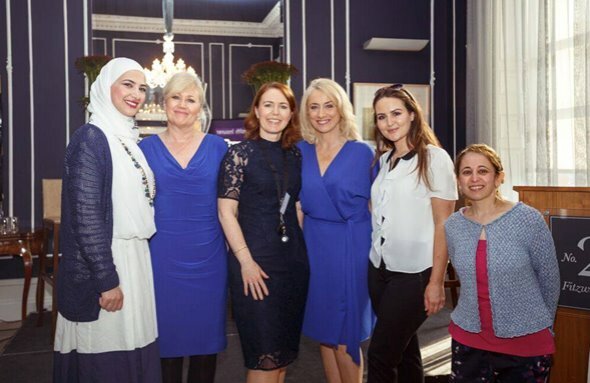May 2017
The Chamber staff attend an empowering evening focusing on wellness, performance and resilience
The impressive panel, included Author and Sports Psychology Lecturer, Dr Olivia Hurley; Irish International Rugby Star, Jenny Murphy; Irish Sprinter and Director of All-Things at PepTalk, Ailís McSweeney and EMEA Group Health Director of Fitbit, Aideen O' Colmain.

The panel discussed goals, resilience and mental wellness, and five of the interesting insights they shared were
1. Don’t change your goal, change your process
Ailis McSweeney, who holds the Irish 100 metre sprint record, spoke about the importance of setting goals. So, if you find yourself struggling to meet your goal, it doesn’t mean you can’t do it, or should stop. She suggested to take a step back, look at what is stopping you and see what can be altered or changed. Your first step should never be to change your goal, but to change your process.
2. Be proud to be powerful
Irish international rugby star, Jenny Murphy, had her first taste of sport thanks to her dad bribing her with a 99. At the time, there wasn’t a girls’ team so she ended up playing alongside boys. When she started to play rugby, she fell in love with the sport. It encouraged her to be fast, to be competitive and made her proud to be powerful. This is something all attendees could agree with. As women, we should never shy away from success or play-down our power.
3. Resilience and courage
Dr Olivia Hurley spoke about the importance of resilience, and the importance of the language we use. We shouldn’t encourage ‘mental toughness’ as it suggests that someone who is not mentally tough is mentally weak. We should instead, encourage resilience and courage. According to Olivia, a key characteristic of high-performance athletes is their courage to be imperfect. They strive for excellence, but never perfection. Perfection is impossible.
4. Adapt to change
Another key characteristic among athletes- that can be applied to business and personal life- is how they adapt to change, Olivia said. Our brains are wired to be wary of change, we don’t like it. However, it’s a part of life, and although you won’t always welcome change, you can work harder at adapting to it.
5. A culture of wellness
EMEA Group Health Director of Fitbit, Aideen O' Colmain, spoke about Fitbit’s focus on employee wellness. This isn’t just about little changes like tracking steps and taking the stairs, it’s also about being mentally well. The panel were all in agreement about the importance of workplace wellness programmes, especially in professional services where there can be a focus on busy-ness and how many hours you put in, as opposed to being productive and present.



